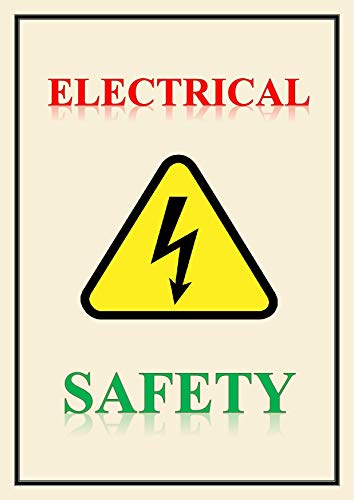What are the Hazards Associated with Electricity? Hazards:
Inadequate wiring.
Exposed electrical parts
Wire with bad insulation.
Undergrounded electrical systems and tools.
Overloaded circuits
Damaged power tools and equipments.
Using the wrong PPE and tools
Overhead Powerlines.
All hazards are made worse in wet conditions.
Q. What are the Precautions to be taken to avoid electrocution?
All electrical work must be covered by an appropriate work permit.
The authorized person approved by the relevant Maintenance Team can carry out electrical work.
Electrical safety floor mats made from a special grade of insulating rubber shall be provided in front of switchboards or high-voltage equipment to protect personnel against accidental electric shock.
Warning tape on top of buried cables and electrical cable tiles must be provided as an early warning notice for excavations.
All portable electrical equipment must be approved by the Maintenance Team and shall be used as per suitability for the relevant area only.
Do not reach blindly into areas that may contain energized parts.
Do not enter into a space where adequate lighting and working space is not available.
Only Industrial type plugs and sockets shall be used on all locations other than offices and houses.
All testing and measuring equipment used for the electrical works should be tested, calibrated and documented.
Ensure all equipments are grounded and should be attached GFCI / ELCB.
Inspect electrical equipments before use.
Electrical Panel, Junction boxes, pull boxes and fitting must have approved covers.
Unused openings in cabinets, boxes and fittings must be closed.
Don‟t overload on a circuit.
Maintain the distance from overhead power lines during the Crane activity and scaffolding erection and other activities.
All cable of power tools / portable tools should be double insulated.
Don‟t use damage extension cords and don‟t touch live wire and another wire at a different voltage.
Damaged equipment must not be touched until the isolated.
Disconnect the power when not in use and when changing accessories.
Use the appropriate PPE for the job.
Competent, qualified and approved personnel should be carry out testing & energizing of the equipment.
Electrical lock-out and tag-out system should be used when working on electrical equipments.
In the event of fire on electrical panel or equipment, the electrical power supply must be isolated and suitable Fire Extinguisher shall be used to extinguish the fire.
Q. What are safety precautions you will take for a temporary electrical connection?
Temporary wiring shall be guarded or isolated by elevating to prevent accident contact with workmen or equipment.
Vertical clearance above walkways shall not be less than 3m (10feet) for circuits carrying 600V or less.
Wires shell is insulated from their support.
Temporary festoon lighting strings shall be made up with cords having lamp sockets and connections protected by insulating coverings.
Extension cord shall be of approved types and used for the purpose for which they are made.
Expose empty light sockets and broken bulbs shall be prohibited.




